
Coffee – the savior of many a morning and the fuel that powers us through the day. But what is it about this magical brew that gives us such an energy boost? The answer, my friends, lies in one word: caffeine.
But how do different types of coffee vary in caffeine content? Well, let’s find out.
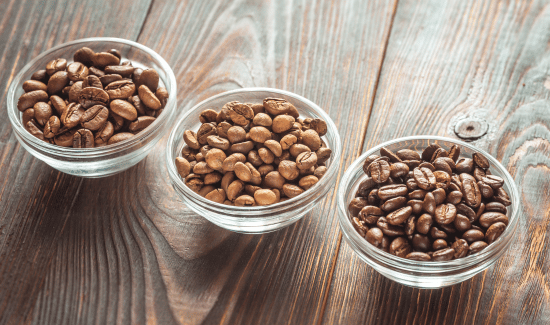
Types of Coffee Beans
Arabica
Firstly, let’s talk about Arabica. Arabica beans are the most popular in the coffee world, known for their sweet, complex flavor. However, they contain less caffeine compared to other coffee beans, approximately 1.2% to 1.5% by weight.
Robusta
Next, we have the Robusta beans, which are significantly easier to grow and more resistant to disease than their Arabica counterparts.
This is because they are chock-full of caffeine, a natural insect repellent. They pack nearly twice the caffeine punch, with caffeine content ranging from 2.2% to 2.7% by weight.
It is important to note that the strength of these beans also makes it possible for them to have a flavor that is more powerful and bold, which may not be in everyone’s favor.
Liberica
And finally, we look at where Liberica coffee beans come from. Liberica beans, which come from West and Central Africa, are a rare type compared to Arabica and Robusta beans. They have an interesting mix of caffeine and flavor.
Not as caffeinated as Robusta but not as light as Arabica either, Liberica beans tend to sit somewhere in the middle of the caffeine spectrum. They hold a distinct charm with a full body, smoky flavor, and a subtle hint of fruit and flowers.
Still, even though they taste good, they aren’t as popular as they could be because they are harder to grow and find.
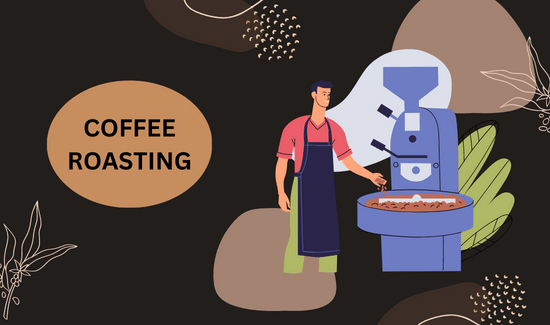
How Coffee Roasting Affects Caffeine Levels
Light Roast
Now let’s switch gears and dive into the art of coffee roasting. Contrary to what some might believe, light roast coffee, often denoted by a lighter color and no oil on the surface of the beans, contains more caffeine than its darker counterparts.
The beans undergo a shorter roasting process, which preserves a greater portion of their natural caffeine content.
Medium Roast
The next kind is the medium roast. As the name suggests, this type of roast is right in the middle of the range. It has a rich taste and a moderate amount of caffeine.
The medium roast process allows the coffee beans to darken a bit, reducing the caffeine content slightly when compared to a light roast, but not by a significant amount.
Dark Roast
Last but not least, we have arrived at the dark roast, which may be identified by its dark, rich, and frequently glossy beans.
Dark roast coffee is coffee that has been roasted for a longer period of time, which gives it a more powerful flavor while also reducing the amount of caffeine it contains. Although it may have the heartiest flavor, the amount of caffeine it contains is not quite as high as that of the other options.
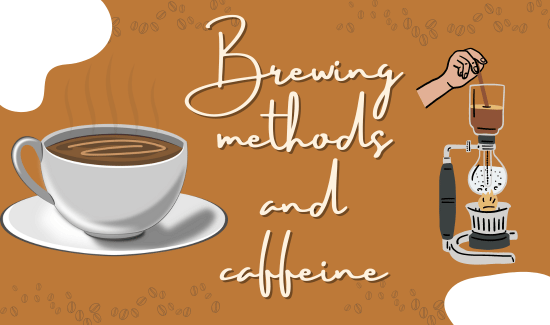
Brewing Methods and Caffeine
Moving on, let’s look at how different brewing methods can affect caffeine content.
French Press
We’ll start with the French press, a method that involves steeping coffee grounds in hot water and then pressing them out. This method yields a coffee that is rich in flavor and higher in caffeine content due to the prolonged contact of the water with the coffee grounds.
Espresso
Next up is the espresso, a method that forces hot water through finely-ground coffee at high pressure. Even though espresso shots are small, they are mighty and have a higher concentration of caffeine per ounce compared to other brewing methods.
Cold Brew
Lastly, the cold brew method is worth mentioning. This brewing process involves steeping coffee grounds in cold water for an extended period. Despite the long brewing time, the lower temperature doesn’t extract as much caffeine from the beans. However, as the cold brew is often served in larger quantities, you might end up consuming more caffeine overall.
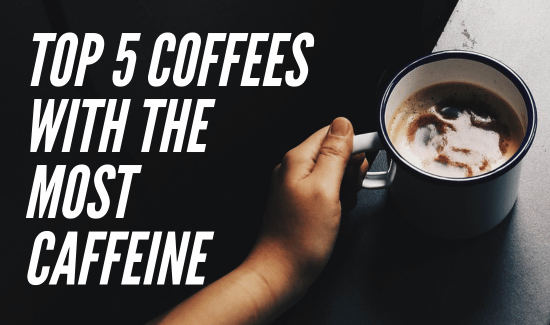
Top 5 Coffees with the Most Caffeine
Now, let’s turn our attention to some specific brands renowned for their caffeine content.
Death Wish Coffee
Starting with Death Wish Coffee, which proudly proclaims itself as the world’s strongest coffee. With a caffeine content of around 728 milligrams per 12-fluid-ounce serving, it’s not a claim to take lightly!
Biohazard Coffee
Biohazard Coffee doesn’t pull any punches either. This brand boasts a whopping 928 milligrams of caffeine per 12 fluid ounces serving, making it an even stronger contender in the caffeine stakes than Death Wish.
Devil Mountain Black Label Coffee
Then we have Devil Mountain Black Label Coffee. This brand tops the list with an impressive 1,555 milligrams of caffeine per 12 fluid-ounce serving. You may need to sit down before drinking this one!
Very Strong Coffee
Continuing the trend, Very Strong Coffee, a UK-based brand, boasts of caffeine content that certainly does justice to its name. Utilizing the power-packed Robusta beans, the brand claims to offer around 1,350 milligrams of caffeine per 12 fluid-ounce serving. Quite the jolt for anyone in need of a significant pick-me-up!
Banned Coffee
Lastly, there’s the cheekily named Banned Coffee. Once touted as the world’s strongest coffee, it contains around 474 milligrams of caffeine per 12-fluid ounce serving. Though it’s not quite as potent as the others listed above, it’s still a formidable option for those seeking a high-caffeine coffee experience.

How to Measure Caffeine in Coffee
Having talked about the different types of coffee and their caffeine content, it’s worth noting how we measure this caffeine.
The most accurate method to determine the caffeine content in coffee is through laboratory testing. But at home, you can estimate it based on the type of coffee bean, the roast level, and the brewing method.
While it’s not an exact science, it can give you a general idea of how much caffeine you’re getting in each cup.
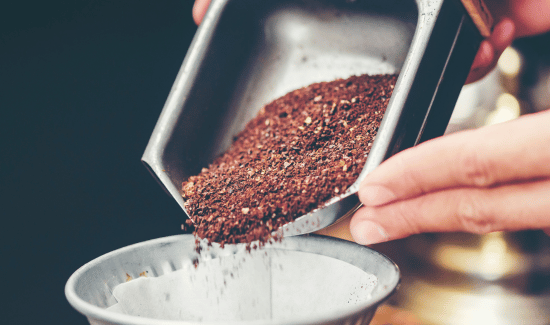
Health Implications of High Caffeine Intake
While coffee lovers might rejoice at the prospect of high caffeine content, it’s important to keep in mind the health implications of consuming too much caffeine.
While moderate amounts can enhance focus and energy, excessive consumption can lead to insomnia, restlessness, heart palpitations, and even osteoporosis. Always remember, moderation is key when it comes to caffeine consumption.
Conclusion
In conclusion, the caffeine content in coffee can vary widely depending on the type of bean, how it’s roasted, and the brewing method. Brands like Devil Mountain Black Label Coffee and Biohazard Coffee have taken caffeine content to extreme levels. However, while these highly caffeinated coffees can give you a serious energy boost, it’s crucial to be aware of the potential health risks of consuming too much caffeine.
FAQs
1. Which coffee brand has the most caffeine?
As of now, Devil Mountain Black Label Coffee holds the title for the coffee with the most caffeine, boasting a whopping 1,555 milligrams per 12 fluid-ounce serving.
2. Does a darker roast mean more caffeine?
Contrary to popular belief, dark roast coffee has less caffeine than light roast. This is because the longer roasting process reduces the caffeine content in the beans.
3. Do different brewing methods affect caffeine content?
Yes, the brewing method can significantly impact the caffeine content. For instance, espresso brewing tends to yield a higher concentration of caffeine per ounce, whereas cold brew might have less caffeine due to the lower brewing temperature.
4. Is it harmful to consume too much caffeine?
Yes, consuming excessive amounts of caffeine can lead to several health issues, including insomnia, restlessness, heart palpitations, and even osteoporosis. It’s recommended to limit your caffeine intake to a moderate level.
5. How can I reduce the caffeine content in my coffee?
The caffeine content can be reduced by opting for darker roasts, using Arabica beans instead of Robusta, and utilizing brewing methods like cold brewing that extract less caffeine.

As a dedicated blogger, I share insights, tips, and knowledge on all things caffeinated and beyond. I firmly believe that a well-brewed cup of coffee or a skillfully crafted cocktail has the power to unite people and ignite engaging conversations.



